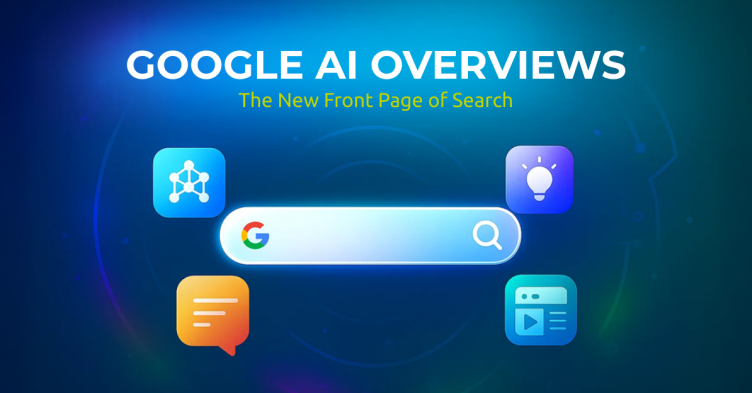The world of SERPs (Search Engine Results Pages) has changed significantly resulting in a change in marketers’ approach to content. The People Also Ask (PAA) feature is an addition to the SERP that has further intrigued digital marketers. The position of the Google People Also Ask (PAA) feature as an important aspect of SEO (Search Engine Optimization) and content strategy has increased drastically over the past few years.
The PAA feature has become more prevalent and based on our data, over 80% of the search queries on the Google SERP had PAA.
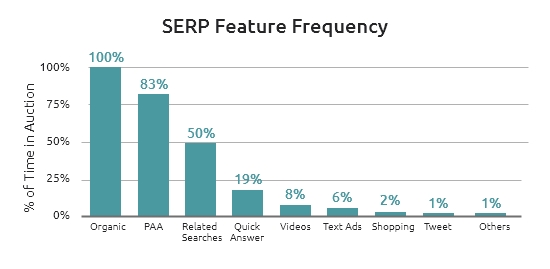
In this article, we will talk about People Also Ask and how it can enhance your site’s reach and increase visibility in Google along with the prominence of PAA boxes to help you optimize your content and maximize your SEO opportunity.
Table of Contents: Show
What is People Also Ask in Google?
The “People Also Ask” is a popular Google SERP feature that answers the list of questions closely related to the intent of the query and quickly provides additional information. It remains one of the most sought-after SERP Features in 2024 offering valuable information to the queries that users are searching for.
An example of People Also Ask is searching a query for any information intent like “People Also Ask”
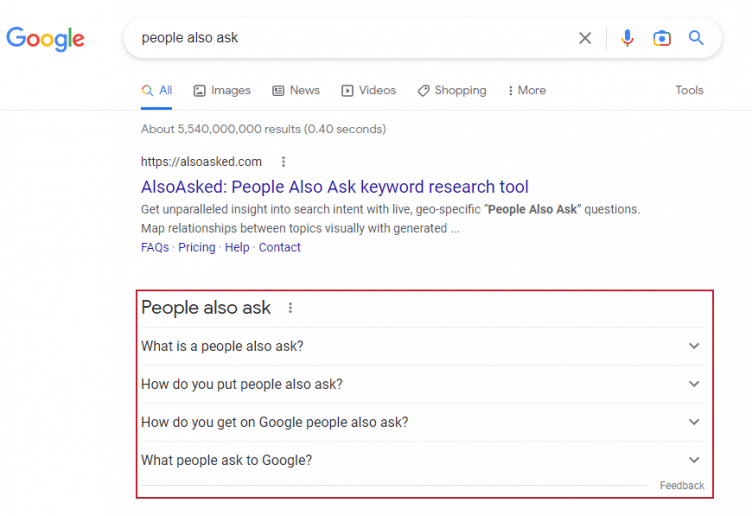
The People Also Ask (PAA) questions can be presented in different formats.
- Paragraphs of Text
- Bullet Points
- Videos
These questions are generated through a combination of Google’s algorithm, user queries, links to search topics, and other metrics that determine relevance. The search engines provide a clickable link to the source below each answer that comes from a relevant web page allowing users to explore further and access more detailed content.
Where Do People Also Ask Boxes Appear in Google SERP?
Upon analyzing the Google SERP Trend data for keywords related to Apparel and accessories, we discovered that over 85% of the People Also Ask (PAA) results appeared within the top 3 search results. This finding indicates the PAA feature’s remarkable consistency and visibility, as depicted in the graph below.
This SERP feature takes up extremely valuable real estate on Google SERP. But the position of the PAA is not fixed and it can appear in several different positions on the SERP.

From our data (from January 2023 – January 2024), we analyzed and listed the most popular questions that are usually displayed in Google SERP.
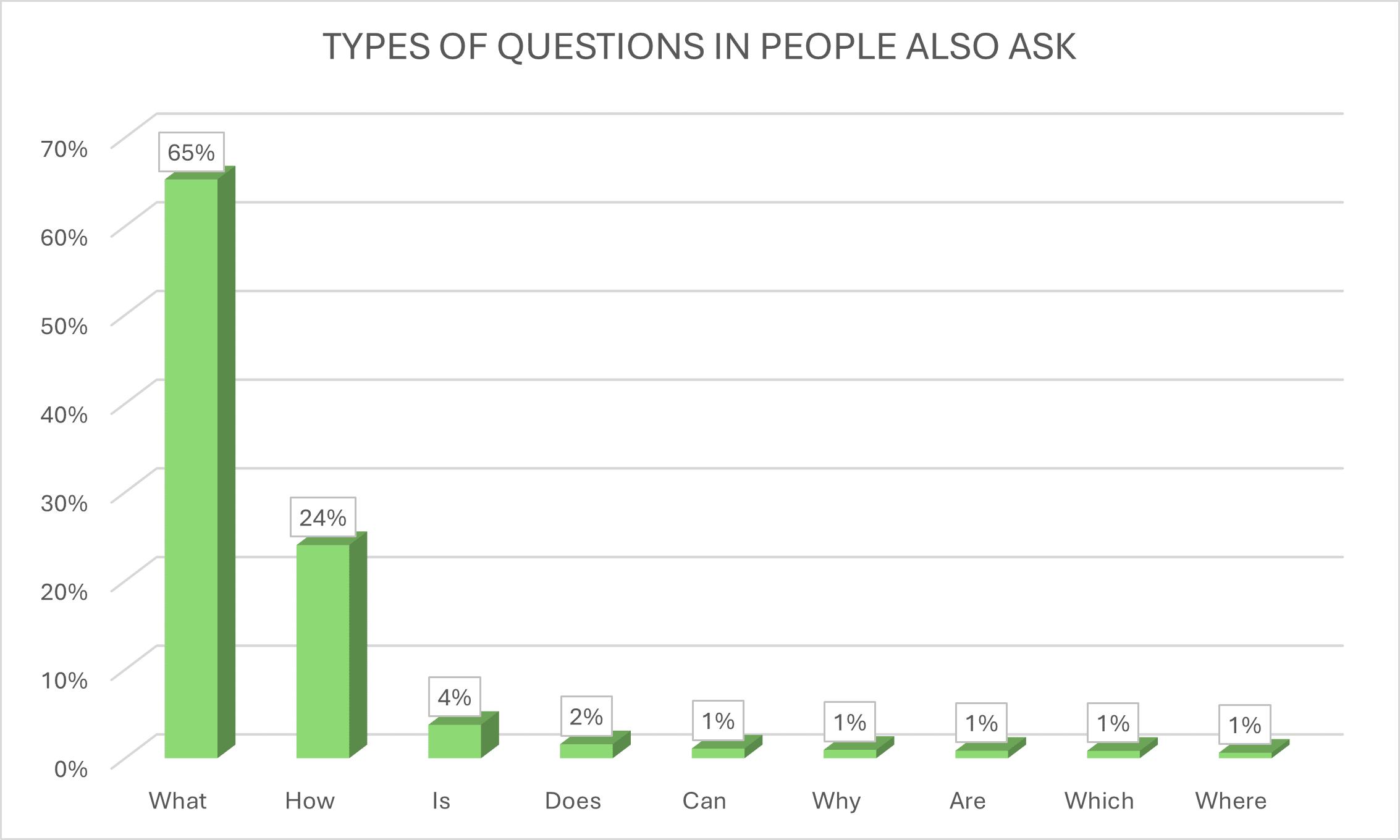
Why is People Also Ask (PAA Box) important for SEO?
The “People Also Ask” SERP feature helps secure a long-term position in SERPs and boosts organic traffic for websites by influencing organic search results. People Also Ask results provide additional information and answers that may be relevant to the searcher’s query or topic of search. The PAA box displayed in Google is a significant component of the SERP and holds importance for SEO campaigns. If your content is PAA-friendly it can result in you holding a place in the PAA box even if your website is not organically ranking in the search results. Some of the reasons why People Also Ask is important are:
Let’s look at this in more detail.
People browsing through the People Also Ask questions are typically in the awareness or research phase of their shopping journey. As a brand, Google PAA gives you the opportunity to entice your top-of-the-marketing funnel shoppers with informative, concise, and easy-to-understand answers.
Although branded queries have a lower search volume, they can make or break a sale depending on the information provided. Branded queries are people that are at the bottom of the marketing funnel. This means they are towards the end of their purchase journey. Google PAA offers brands the opportunity to ensure they are being portrayed in the best possible manner by appearing under their branded queries. If there are answers on the PAA boxes besmirch your brand by other parties, then you will potentially lose the customer to a competitor.
Unlike Featured Snippets, you can have your site/page rank for a People Also Ask a question, as a standard organic/paid link on that same SERP. It is undoubtedly beneficial to appear in both the standard usual result and the PAA. However, the PAA offers opportunities for sites with lower authority to enhance their impressions and clicks. Thus, showing up under the organic SERP feature increases your credibility and trustworthiness to Google improving your probability of ranking higher and building organic traffic.
According to Search Engine Land, a Featured Snippet gets approximately 8% of all clicks which shows the high value of this SERP feature. But there is only one Feature Snippet per SERP. Whereas there can be seemingly infinite PAA results on every SERP.
Data indicates that the answers featured in the Snippets often come from the PAA results. Therefore, appearing in the PAA section offers additional opportunities to rank for the Featured Snippets as well.
Your competitors may still be dependent on presumptions and speculations to create content. With the help of PAA questions, you can gain an obvious competitive edge by making data-driven decisions. GrowByData Search Intelligence solutions can track People Also Ask questions and help you spot which of your competitors have a higher/lower visibility on PAA than you as shown in the graph below. The tool also allows you to dive deeper into what types of queries your competition is showing for. This gives you the opportunity to create better and more useful content to dethrone the competition.
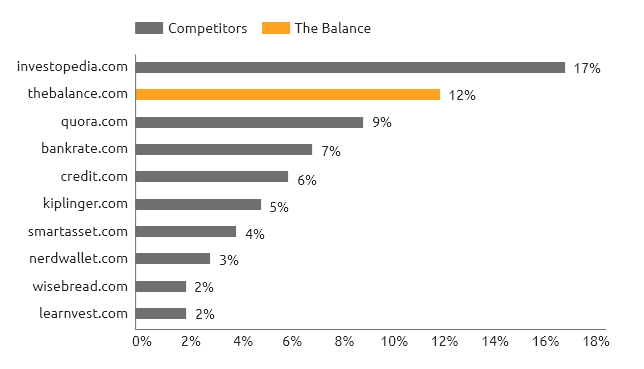
How to Optimize for People Also Ask Boxes in 7 Steps?
With the rise of PAA and the ever-increasing competition for a spot in SERP features, you need to implement an actionable plan to appear within the PAA box. If you are trying to rank on Google PAA box, these 7 key steps will assist you in PAA optimization and converting user interactions into actual clicks.
1. Identify PAA Opportunities in Your SERP Landscape
Get ahead of your competition and capture the interest of your target audience by being featured as an answer to People Also Ask (PAA) questions. Optimize your content for relevant questions that show up for lots of keywords with a high combined monthly search volume. It is critical to know if the set of keywords you are targeting has the potential to rank in the PAA section. Assess the keywords that trigger PAA questions where you are not currently listed, and evaluate your chances of enhancing your position with Competitive SERP Analytics.
2. Understand User Intent Behind the PAA Questions
People Also Ask is an exciting feature on Google SERP. Clicking a question automatically generates additional related questions. The questions could dive deeper into the searched query or take you on a different tangent from the initial search query. Google relies heavily on semantics to anticipate the user’s next questions and brings answers that possibly satisfy their needs. You need to focus not only on the keywords but also on the intent of the question. When it comes to SEO techniques, it is important to focus not only on keywords but also on the intent of the question. Your priority should be to provide answers with useful details that benefit the person asking the question. Google’s main objective and priority is to provide the best answer that aligns with the search intent.
3. Optimize Content Structure and On-Page SEO
You should start optimizing your page content by checking whether the answer to the question is available on your page. Make sure your answer is detailed and easy to understand to maximize your chances of ranking. If your page lacks the answers, you need to add the necessary information. Provide concise answers to the questions and utilize techniques that enhance the user experience. You can check which format Google expects and adjust the formatting. Messy code can often confuse Google, so using clear headings (H2, H3, etc.), and eliminate any unnecessary errors that could potentially confuse Google. You should focus on creating structured content as quality and relevance matter a lot when it comes to ranking in PAAs (People Also Ask).
4. Look for popular questions on google trends, reddit and PAA boxes to target
Find the pages with high-ranking keywords and list the most frequently occurring or popular questions related to high-volume and targeted keywords for your page. If the same question appears in the PAA box for hundreds or thousands of keywords, then it is potentially worth optimizing for. Understanding the possible questions a user may ask after the initial search query and then creating content around those questions is how you optimize for the People Also Ask SERP feature.
Find the pages with high-ranking keywords and list the most frequently occurring or popular questions related to high-volume and targeted keywords for your page. If the same question appears in the PAA box for hundreds or thousands of keywords, then it is potentially worth optimizing for. To optimize for the People Also Ask SERP feature, it is important to understand the potential questions a user may ask after their initial search query and create content around those questions.
GrowByData Search Intelligence platform can assist you in learning the most frequently asked questions, enabling you to swiftly optimize your content and enhance your visibility on the PAA feature. For example, the table below shows the list of PAA questions that were the top questions that came up regarding a client’s business and the ones that were the most frequently asked questions as well. This helped the client better cater to searchers’ most asked queries and possibly increase their visibility on the PAA feature.
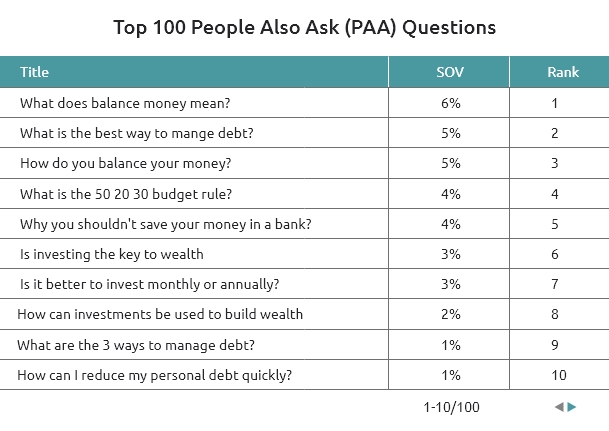
5. Add semantic-rich search terms to your content
You can expand your reach to additional questions by adding semantic-rich search terms to your content. This can provide more depth and context, supporting your content effectively. Google uses Contextual Search to populate multiple PAA drop-downs, so it becomes crucial to determine which keywords are effective and which ones are not. You can look for which elements are positively affecting each site’s overall organic traffic and organic CTR (Click Through Rate). During your keyword research, you can take note of which of your primary keywords are triggering PAAs and query phrases that are useful to answer questions to improve on those that align with your target audience’s queries.
6. Use FAQ Schema Markup to Appear in PAA and Snippets
A considerate FAQ helps your web page rank higher and brings organic traffic to your site. You need to logically collect the questions based on search patterns and provide valuable and credible answers to these questions in your website’s FAQ section. You can create interesting features like generating featured snippets by making use of FAQ page schema which increases user engagement with your brand and eventually brings a high volume of traffic to your site. Using the correct schema can help your site’s content get featured in the PAA as well.
7. Add Jump Links to Improve UX and Search Crawlability
Creating jump links makes it easier for your site visitors to quickly see the answer that they want. Taking the viewer straight to the specific answer section of the page can improve your bounce rate as well as crawling and indexing. On top of the page, you can create a table of context, and each jump-link takes you to the part of the page answering each question.
How SERP Monitoring and Search Intelligence Help You Rank in People Also Ask (PAA)?
SERP Monitoring allows you to monitor and track each component of the SERP based on search intent, category, regions, and more. It also enables you to analyze the winning ad content in the top positions. Specifically, tracking People Also Ask (PAA) on Google SERP can provide strategic insights into the most popular types of questions for a specific search query or broader category. The search query including terms like ‘where,’ ‘why,’ ‘how,’ etc., significantly increases the possibility of Google displaying video content in the results. The graph below shows the PAA prefix distribution for a financial advisory business. Insights like this let you minimize wasted efforts and resources by making better decisions on what type of questions to focus on. By targeting the right questions and optimizing your answers accordingly, you significantly increase your chances of ranking on PAA.
Learn more about it in our article “What is Search Intelligence”
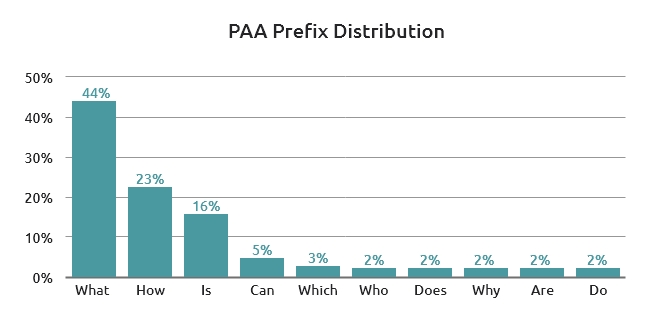
How People Also Ask Can Improve Your SEO Strategy?
It is the basic concept of any SEO activity to satisfy user intent but with almost 50% of all searches showing People Also Ask results, having a specific strategy for increasing your visibility within these features is crucial. Along with ranking in common People Also Ask boxes, these questions are important for your content and business and can help with SEO. Some of the ways to incorporate PAAs into your SEO strategy are:
1. Use PAA Boxes to Generate Better Content Ideas
It is important to understand the intent of the searcher and a search query can return several organic search results and give you a list of questions that might be quite relevant to your content and cover the searcher’s intents. People Also Ask boxes give insight into related things searchers want to know. Incorporating these answers into your content can lead to more in-depth content that better satisfies searcher intent.
2. Discover Long-Tail Keywords Through PAA Expansion
Many of the questions that show up in People Also Ask boxes rarely seem to have high search volumes. But if you pick up the questions and use them as main queries, you may find websites that rank high with huge traffic. Analyzing those websites will reveal various keywords that they are ranking for. The use of conventional keyword research can reveal those keywords. If you keep expanding to reveal more questions in PAA boxes you can come across questions related to topics and get more and more topics and keyword ideas.
3. Refresh Outdated Content With Relevant PAA Questions
You can use PAA questions to bring back the relevancy of the old content pieces you created and optimized for SEO which is no longer relevant. The PAA questions you find today are the most relevant questions which reflect users’ intent. You can refresh your old content and stay relevant even with your old content by fulfilling those intents.
Conclusion: Why People Also Ask Is Essential for SEO in 2025
People Also Ask has become a standard feature in Google SERP and ranking in People Also Ask boxes can undoubtedly boost organic traffic, improve brand awareness, and increase visibility to gain a competitive advantage. You should focus on the ranking of popular keywords and focus on providing valuable content to your users. This SERP feature can help your SEO strategy move forward and if you are willing to spend time understanding how your organic visibility can be influenced by such features PAA can be your friend indeed.
Google might consider PAA a key part of the user journey for the fact that they are now popular for a large portfolio of queries. Now it is high time for you to start optimizing for the SERPs interactive feature-PAA starting today which has taken over the SEO world.


